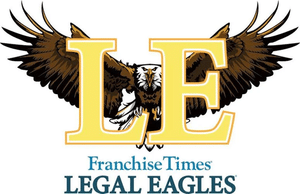by Emilee Wentland
Published in the Franchise Times, March 2025
Bankruptcy gets a bad rap. It feels like an admission of defeat, guilt or failure, and many parties who could benefit from a bankruptcy filing put it off for too long because of that.
 “People wait too long to file bankruptcy until they’re so desperate that they have not much to save,” said Tom Spadea, founding partner at Spadea Lignana. “It’s like going to the hospital. If you’re feeling those symptoms, the sooner you get to the ER, the better chance you have of surviving whatever that catastrophic problem is. Business is the same way.”
“People wait too long to file bankruptcy until they’re so desperate that they have not much to save,” said Tom Spadea, founding partner at Spadea Lignana. “It’s like going to the hospital. If you’re feeling those symptoms, the sooner you get to the ER, the better chance you have of surviving whatever that catastrophic problem is. Business is the same way.”
Bankruptcy isn’t always the end of a business; it’s usually a survival strategy to restructure a business before things are beyond repair, Spadea said.
“When you go through these reorganizations, it’s really with an eye toward survival,” Spadea said.
The need for bankruptcy can come about for a number of reasons, including selling too many franchises, developing an unprofitable business model, poor management and undercapitalization. There are different bankruptcy chapters, too, so parties can decide if restructuring or selling assets and dissolving are the best path for them.
In the last two years, there have been a number of significant franchisor and franchisee bankruptcies. On the brand side, TGI Fridays, Red Lobster, Anchored Tiny Homes, BurgerFi and Anthony’s Coal-Fired Pizza declared bankruptcy last year.
DMD Ventures, an eight-unit Twin Peaks franchisee, filed for bankruptcy protection in January. Applebee’s franchisees Apple Central KC and Louisiana Apple filed as well. Two Orangetheory Fitness franchisees filed an involuntary Chapter 7 bankruptcy petition against the brand’s largest operator last fall as a result of a private equity creditor reportedly owing them millions. And there are many more.
Often, trouble starts to show itself in franchisees who are struggling financially. “It doesn’t take many of those to really turn the franchisor upside down,” Spadea said.
Franchisors can go to bankruptcy court and essentially say they’ve messed up somehow and need to restructure.
“It’s going to be better for everybody if we reorganize, as opposed to having maybe the first two or three claimants grab all the cash and the business just closes,” Spadea said. “What bankruptcy affords you is this reset opportunity to say, ‘look, we’ve made some mistakes. We owe a bunch of money. The business isn’t what we thought it was going to be.’”
Bankruptcy lawyers and judges try to balance the needs of stakeholders with those of the filing party, Spadea said. For example, if franchisees are owed money, it won’t help them if the franchisor shuts down entirely because then other operators would stop paying into the system and the franchisor would have even less revenue. Therefore, the franchisees who are owed money would, in theory, get paid back less.
“It gives pause so that everything can get organized and the valuable parts of the business can be saved, and the parts of the business that are hurting the business can be put in a box,” Spadea said.
When franchisors file, there are a lot of constituents to consider that could be impacted by the bankruptcy, said Deb Coldwell of Haynes Boone. Franchisors need to ask themselves: Should we reorganize and continue operations to pay back our creditors? Or should we sell our assets, pay back creditors where possible and ultimately shut down?
“Some franchisors come out of it and continue to monitor and run a less-robust or smaller system,” Coldwell said.
On the operator side, Coldwell said bankruptcy attorneys aim to get the highest value possible for their clients. If a franchisee wants to continue operating under the brand, they’d file an administrative claim so operators can continue using the trademark and keep their stores open throughout the bankruptcy process.
Franchisors are still affected when a franchisee declares bankruptcy, even though they aren’t the party directly involved in the filing, said Elizabeth Weldon of Haynes Boone. When attorneys represent the franchisors in this instance, they could file a proof of claim as a creditor because the operators owe them money.
“Oftentimes, it’s very unsatisfying as somebody representing the creditor in those situations, because the business just kind of fades away,” Weldon said. “You get either pennies on the dollar for your claim, or nothing on your claim, very often.”
If a brand deems a franchisee’s bankruptcy filing unnecessary, they could file an adversary claim, Weldon said.
“If you think that there really aren’t grounds for that bankruptcy, or perhaps a particular debt should not be discharged in the bankruptcy, you can file a claim in that bankruptcy to say, ‘hey, don’t let this claim go,’” she said. “There’s different avenues that you can undertake here, but it’s extremely, extremely regulated by the bankruptcy rules.”
The best practice for those who are operating post-bankruptcy? “Watch your debt,” Coldwell said. “Keep it clean and simple going forward. … Check the underlying reasons that the bankruptcy happened in the first place, and try to avoid those mistakes.”
Weldon echoed Coldwell’s comment. Those who survive bankruptcy and come out with an viable business need to focus on stability across the board, she said.
“Try to run a stable business,” Weldon said, “where you don’t have too much credit, where you appeal to consumers and, for the people that are your constituencies, perhaps your franchisees, they can see and feel that you’re running a stable business.”







